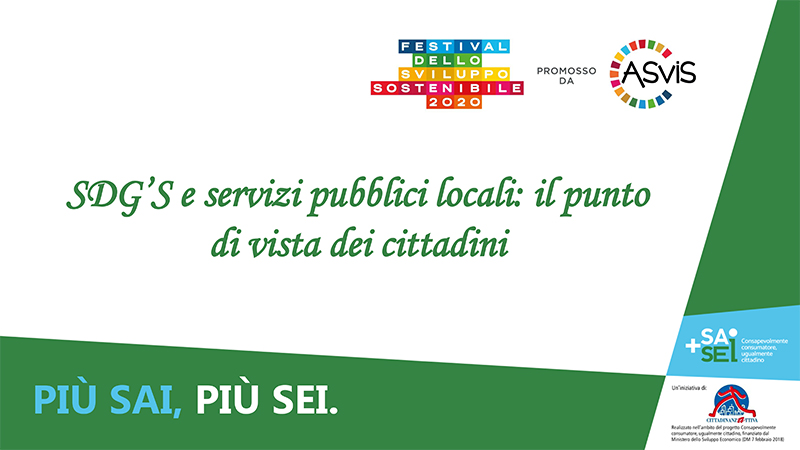
Local public services: at the low of the users' satisfaction ranking, there is the local public transport. Sustainability goals are considered hardly reachable. Here are the results of Cittadinanzattiva's civic consultation.
Citizens are not completely satisfied with the public services in their city; there is a gradually decreasing level of satisfaction from the North to the South of the country. Water service is the most appreciated, followed by the waste collection one, while the local public transport ranked last. But how is Italy doing with regard to the achievement of Sustainable Development Goals? According to citizens, it is not doing so well: almost half of them have little faith in the possibility of improving and making these sectors sustainable, as indicated by the Agenda 2030's goals.
This is what Cittadinanzattiva reports through its Civic consultation on local public services and sustainable development goals as part of the project "Consciously consumer, equally citizen," financed by the Minister of Economic Development according to the DM of February 7th, 2018.
3,586 citizens- almost 90% aged 18-65- participated in the consultation, of which 45% has a high school diploma and about 44% has a bachelor's degree. 40% of the respondents come from the center of Italy, 37% from the North, and 23% from the South.
The consultation focused mainly on three sectors: local public transport, water service and urban waste management.
In particular, more than two users out of three think their city cannot guarantee accessible, safe and sustainable public transport by 2030, as established by the Agenda, and that it will not be possible to halve the number of deaths or injuries for car accidents at the global level.
Nearly more than one citizen out of two thinks it will not be feasible to improve water quality and safety by 2030 and less than half say that the number of people suffering from water shortage will not be reduced substantially, as expected by Agenda 2030's goal 6.
Almost 53% believes that there will be a reduction in waste production but the percentage falls to 48% among those who deem the goal of cutting the consequent environmental impact possible.
Trustless citizens because unsatisfied with the services
"Citizens' little trust in the possibility of achieving the Agenda 2030 goals derives from an evident dissatisfaction for the quality of services provided at the local level. Therefore, we believe that it is necessary to intervene in some key factors for the services' good functioning: for example, by enlarging the network and means provided to the public transport, by improving the complaint management and dispute resolution in every field, by interceding in the waste management service, in particular for what regards costs- considered excessive by citizens- and legal protections, which are still too marginal or even inexistent at all", as stated by Antonio Gaudioso, Cittadinanzattiva's Secretary General.
Concerning transport, in sight of average spending of about €300 for the annual pass (Source: Osservatorio Prezzi e Tariffe di Cittadinanzattiva), citizens complain about the poor accessibility to the local public transport in terms of architectural barriers, service extensiveness and the availability of the client service (consultation's average score of 2.07 in a scale 1-4); plus, they declare to be "a little satisfied" of the quality (2.31) in terms of cleaning, punctuality, and continuity, and "not at all satisfied" (the total average score is 1.83) in the protection category, evaluated in terms of availability of info regarding how to submit a claim, complaint management, reimbursements, and conciliation process. In fact, the indicators of quality and forms of protection are scarcely treated in the Service Charters of transport companies.
Regarding water service, in sight of an average family spending of €434 in 2019, most citizens believe to be "somewhat satisfied" with the service's continuity and regularity in their city (the average score is 3.19 on a scale of 1-4). Here again, the satisfaction level decreases compared to the complaint, conciliation, and expected reimbursements management (indicated value is slightly more than 2). In detail, 38% of the respondents are "a little satisfied" with the complaint management and 35% "of the available info to submit a claim"; 48% denounces the absences of indemnities where disservices should take place, and 59% denounces the absences of conciliation proceedings.
Regarding the waste management service, in sight of an average family spending of €300 in 2019 (Osservatorio Prezzi e Tariffa Cittadinanza), most citizens say they are "a little satisfied" with the service's value for money (average score 2.36), 59% says they are "a little or at all satisfied" with the quality, in particular with the bin maintenance and cleaning, whose frequency of cleaning info is absent in 54% of the examined Service Charters. Little more than 50% say they are "at all or a little satisfied" with the street cleaning and sweeping service, whose info is absent in 63% of the analyzed Charters.
The field of protection seems to be the weakest even in this service: in fact, most citizens say they are "a little satisfied" with the tools it has (average score2.24). This judgment finds confirmation in our Charters analysis: even in this case, indeed, the Charters result to be lacking very important information.
(Document translated by Michaela Papavero, Active Citizenship Network staff)












